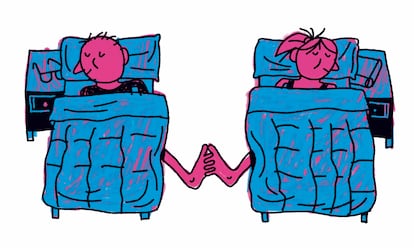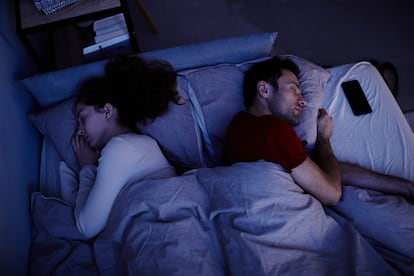Sleep Divorce: Is it better to sleep together or apart?
Having separate rooms, as the upper classes once did, or sharing a bed only on weekends are new ways of interpreting the marital duty of sharing a bed

There is an old story from Japan about a highly renowned sumo wrestler who won many matches and trophies. He married a young woman and began sleeping with her in the marriage bed. After one or two months, the athlete began to undergo a transformation. He felt tired and had less strength. It became increasingly difficult for him to train, and he began to lose tournaments.
The athlete went to the doctor who, after several sessions in which he carefully examined him and studied his case in depth, came to the conclusion that the loss of energy came from sleeping with another person. Not wanting to crush his small, delicate wife while the two were in bed, the sumo wrestler limited the movements he made in his sleep that helped him relax and release tension. So, the doctor prescribed that, after having sexual relations with his wife, the couple should sleep in separate beds. After following these tips, the wrestler regained his energy and became the great fighter he had always been.
Sleeping together or separately is becoming a topic of debate among couples, who no longer feel there is a marital duty to share a bed. This is especially true if the phase of falling in love has passed, if the couple is already more mature in age and falling asleep becomes an increasingly delicate matter, or if the nighttime habits of both partners are incompatible. But, assuming that health comes first, which is better for a restful sleep: sleeping alone or with a partner?
In principle, if what we are talking about is sleeping and not having sex (two very different things), the optimal thing would be to have as much space as possible. A bed for only one in which there are no barriers or obstacles on our path to a good night’s rest. But this is not always the case. “There are many studies that demonstrate the emotional benefit of sleeping with someone, and how cuddling or having physical contact with another person promotes sleep and the production of serotonin and dopamine,” says neurologist Cristina Guijarro, head of the Department of Neurology at the DKF Clinic, in Madrid, and a specialist in sleep disorders.
“But, in addition,” she continues, “close contact with the other, at all levels — including the skin and genitals — benefits our intestinal microbiota, which is replaced and enriched. It also aids our immune system, which has to work to neutralize all types of unwanted microorganisms. Obviously, this works if there is mutual attraction, affection, and trust in the couple. It’s like little children, when they sleep with their parents they feel safe and protected.”
Sleep has several stages, and some are more active than others. “In the first phase of sleep the body is not relaxed, but rather makes physiological movements that are totally normal, except in those people who have pathologies such as the so-called periodic limb movement disorder. In the REM phase, however, the muscles are relaxed, but there is a lot of brain activity. This is when we dream,” says the neurologist.

If we move when we sleep, the equation of “more space equals better sleep” does not seem far-fetched. However, Guijarro argues that having a king size bed does not necessarily guarantee that you will sleep better. “I would say it’s a cultural thing. There are tribes that sleep in small hammocks, hanging from trees. Throughout history the beds have varied. Some beds were really narrow, and that didn’t cause people to sleep any worse. It’s a matter of getting used to it. Although of course, those who sleep in a large bed will notice the difference if they later move to a smaller bed.”
As the sleep specialist points out, restful sleep depends rather on what is called sleep hygiene: “A series of basic conditions necessary for a good rest, which include: darkness, silence, and a suitably cool rather than warm environment.” In addition to not eating or exercising before going to sleep, “Nor drinking too much, because we will wake up to go to the bathroom.”
Could it be that we love each other less?
Until 2021, 44-year-old Madrid resident Sara lived with a partner, and they slept in separate rooms. At that time, she was a staunch defender of what has been called “sleep divorce.” “It was very difficult for us to sleep together. But this started before we stopped having sex. I remember that we would go to a hotel and we would have sex, but it would be difficult to fall asleep together at bedtime. That’s why we used to request rooms with two beds.
My ex was the one who suggested sleeping in separate rooms (fortunately the apartment allowed us to do so) and at first it made me feel bad (he doesn’t love me anymore!), but then I breathed a sigh of relief. When we finally broke up, I continued spending the night alone to the point that, if I hooked up with anyone, it was difficult for me to share the bed later if he stayed the night. I thought I was condemned to spend the nights alone, until I met my current partner. As if by magic, all my dislikes and discomforts disappeared and now we always sleep together, cuddling. I love getting up and having someone by my side, or waking up, finding that the other is also awake, and having a deep conversation in the middle of the night.”
Sara’s conclusion is blunt: “The body expresses our emotions long before we are aware of them. We become picky, fussy, and unfriendly at bedtime because we no longer like company. I am very clear that in my case it was like that.”
Therefore, it seems that sleeping together strengthens the relationship and the microbiota in happy couples. Another question is how you spend the night when you don’t have that degree of unity or infatuation, which does not necessarily indicate that the solution is divorce. In this case, putting a little distance between the bedfellows when night comes can avoid problems in the relationship. This is the conclusion reached by a study, Sleep and Partners Research 2023, carried out by The Better Sleep Council. The study indicated that, although most couples maintain that they sleep better if they are together, a quarter say they rest more alone. Spending the night together can intensify feelings of love and togetherness, but it can also disturb rest, which can negatively affect the relationship in the long run.
Sleeping together: a modern idea
The royalty and upper classes of the 17th and 18th centuries knew this, and each spouse had their own bedroom. It was the lower classes who slept together due to lack of space in the houses. As a consequence of the plagues and epidemics that devastated Europe, hygiene became a priority for those who lived in the 19th century. So, many experts of that time believed that the key to combating diseases was to eliminate dirt in homes and maintain distance to avoid contagion from the miasmas emitted by our bodies. Thus, twin beds were seen as a vision of the future to solve these issues for middle-class couples.

But, the idea about marriage changed after World War II or, perhaps, it was to repopulate the continent after the devastating losses. The point is that sleeping apart began to be interpreted as a sign of a distant or failed marriage, and no one wanted to give that impression to their neighbors when they were invited to dinner and shown around the house.
“Many couples still maintain this prejudice,” says Gloria Arancibia Clavel, a psychologist and sexologist, whose office is in Madrid, “or they think that by sleeping apart they will lose physical connection and the opportunity to have sexual relations. Perhaps the ‘pious relationship’ of when one wants it and the other doesn’t, because they are very tired and in they end agree, is not so frequent. But, sleeping together does not necessarily mean there will be a better sexual experience. Sometimes it is good to miss each other and for quality to prevail over frequency. Furthermore, sleeping separately can give rise to numerous games, visits, or “raids” on the other’s bed.”
For Arancibia Clavel everything depends on the phase the couple themselves are in: “At the beginning of a relationship there is always more desire for permanent contact. But a healthy relationship is based on two independent parties that come together and negotiate things. There is no reason to put up with snoring or certain pathologies that prevent a good rest for the sake of love, because that is going to take its toll on the relationship in the end. There are also intermediate variations such as sleeping separately during the week and sleeping together on Friday and Saturday nights, which can be very interesting,” says this sexologist.
Cristina Guijarro remembers the proverb that warns us: “ ‘Two who sleep on a mattress become of the same condition,’ which is not to say that insomnia is contagious, but there is no doubt that disturbances in our own sleep affect our bed partner’s.” It is also said that how we spend the night will determine how our day will be. You must, therefore, look for the sleeping arrangement that best suits your needs and desires. And don’t forget that you can also have sex in daylight.
Sign up for our weekly newsletter to get more English-language news coverage from EL PAÍS USA Edition
Tu suscripción se está usando en otro dispositivo
¿Quieres añadir otro usuario a tu suscripción?
Si continúas leyendo en este dispositivo, no se podrá leer en el otro.
FlechaTu suscripción se está usando en otro dispositivo y solo puedes acceder a EL PAÍS desde un dispositivo a la vez.
Si quieres compartir tu cuenta, cambia tu suscripción a la modalidad Premium, así podrás añadir otro usuario. Cada uno accederá con su propia cuenta de email, lo que os permitirá personalizar vuestra experiencia en EL PAÍS.
¿Tienes una suscripción de empresa? Accede aquí para contratar más cuentas.
En el caso de no saber quién está usando tu cuenta, te recomendamos cambiar tu contraseña aquí.
Si decides continuar compartiendo tu cuenta, este mensaje se mostrará en tu dispositivo y en el de la otra persona que está usando tu cuenta de forma indefinida, afectando a tu experiencia de lectura. Puedes consultar aquí los términos y condiciones de la suscripción digital.









































